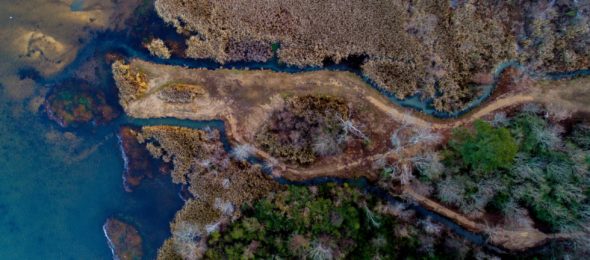2022 Association for the Study of Literature and Environment (ASLE) Symposium
June 24-26, 2022
University of Delaware
CALL FOR PROPOSALS
In hydrographic terms, watersheds are stretches of land that divide bodies of water from others. As the vast Chesapeake Bay watershed makes clear – draining the states of New York, Pennsylvania, Delaware, Maryland, Virginia and West Virginia – watersheds congregate and build; obviate political boundaries; blur lines between the terrestrial and aquatic, fresh and salt; seep and produce; teem and transform. Temporality in the watershed is also messy: times sink, sediment, and circulate as the past mingles with the present. Returning to these sites raises significant questions about navigating the shifting conditions of Anthropocene life. Influenced by Black, Indigenous, and feminist voices protesting the harms of contemporary petrocapitalism (amongst other systems), the “watersheds” of our symposium acknowledge the social pressures and precarious material cultures that form, inhabit, and trouble their places both slowly and with speed.
The word “watershed” has accrued metaphorical connotations: “shed” derives from the Old English words for “sheath” (n.) and “scatter” (v.). To live in watershed ecologies is to dwell in the uncertainties of shelter and refuge; it demands inquiring who is not allowed these affordances and why certain multispecies communities have lost said protections. How, we ask, do watersheds engage with the matters of environmental, climate, and racial justice on political, ethical, and moral levels? We also accentuate the inflection point that a “watershed” signifies: a pivotal moment, a turning toward a hopeful set of futures, a wetting of arid words like “landmark” and “milestone.” What is to be gained, reimagined, and sifted through by alluvial thinking? We invite a variety of interdisciplinary approaches that seize upon the potential that watersheds, ultimately, hold out to those who think with/in their porous borders, polysemous meanings, and brimming possibilities.
Topics include but may spread beyond:
- Multispecies justice movements and decolonizing efforts
- Elemental mixtures and porous corporealities
- Science studies and traditional ecological knowledges
- Rhetoric and composition within seeping spaces
- Mixed media and material cultures of global wetlandia
- Literary representations across genres and periods
We invite proposals for pre-formed panels and roundtables, as well as individual papers from scholars in any discipline.
The conference will take place in-person at the University of Delaware from June 24-26. Friday and Saturday will be devoted to panels and plenary speakers (TBA), while Sunday will involve field trips in the surrounding Chesapeake Bay watershed.
To propose an individual paper, please send an abstract of approximately 300 words and a brief speaker bio to udasle22@gmail.com by Febru
For more information, please visit the conference website.








